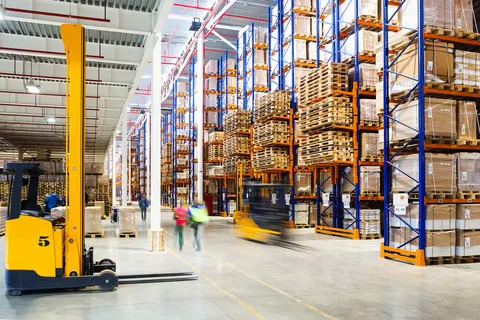In the ever-evolving world of e-commerce, efficient logistics, and Fulfillment are crucial to staying competitive. As online shopping grows, the demand for sophisticated warehousing and fulfillment solutions has never increased. This article delves into the importance of e-commerce warehousing and third-party logistics (3PL) fulfillment, exploring how these components work together to streamline operations and ensure customer satisfaction.
The Role of E-commerce Warehousing
E-commerce warehousing refers to the storage of goods that are sold online. Unlike traditional warehousing, which might serve various types of businesses, e-commerce warehousing is explicitly tailored to the needs of online retailers. This includes managing inventory, processing orders, and ensuring that products are ready to be shipped to customers as quickly and efficiently as possible.
The role of an e-commerce warehouse goes beyond simply storing products. Modern e-commerce warehouses are equipped with technology and systems that allow for real-time inventory tracking, automated picking and packing, and seamless integration with online sales platforms. These features enable businesses to keep up with the fast pace of e-commerce, where customers expect quick delivery and accurate order fulfillment.
Efficient warehousing is critical to minimizing costs and maximizing profitability. By optimizing space, improving inventory management, and reducing errors in the fulfillment process, e-commerce warehouses help businesses lower their operational costs. This efficiency also translates into better customer experiences, as orders are fulfilled accurately and delivered on time.
What is 3PL Fulfillment?
Third-party logistics (3PL) fulfillment refers to outsourcing the logistics and fulfillment processes to an external provider. A 3PL company manages everything from warehousing and inventory management to picking, packing, and shipping orders. For many e-commerce businesses, partnering with a 3PL provider is a strategic move that allows them to focus on core business activities, such as product development and marketing, while leaving the complex logistics to experts.
3PL providers offer a range of services that can be customized to meet the needs of individual businesses. These services typically include:
Warehousing: 3PL providers operate warehouses where they store inventory on behalf of their clients. These warehouses are often strategically located to ensure fast shipping to customers across different regions.
Inventory Management: 3PL providers use advanced software to track inventory levels in real-time, allowing businesses to manage stock more effectively and avoid stockouts or overstocking.
Order Fulfillment: When a customer places an order, the 3PL provider handles the entire fulfillment process, from picking the product off the shelf to packing and shipping it to the customer.
Shipping and Delivery: 3PL providers often have partnerships with major carriers, enabling them to offer competitive shipping rates and faster delivery times.
Returns Management: 3PL providers also manage returns, handling, receiving, inspecting, and restocking returned items.
The Benefits of E-commerce Warehousing and 3PL Fulfillment
The combination of ecommerce warehousing and 3PL fulfillment offers numerous benefits to online retailers. Here are some of the key advantages:
Scalability: As e-commerce businesses grow, their logistics needs become more complex. A 3PL provider can quickly scale operations to accommodate increased order volumes, seasonal fluctuations, and expansion into new markets. This flexibility is crucial for businesses looking to grow without logistical challenges.
Cost Efficiency: Outsourcing fulfillment to a 3PL provider can be more cost-effective than managing it in-house. 3PL providers operate at a larger scale, allowing them to negotiate better rates with carriers and suppliers. They also have the expertise to optimize warehousing and fulfillment processes, reducing errors and inefficiencies that can drive up costs.
Focus on Core Competencies: By outsourcing logistics to a 3PL provider, e-commerce businesses can focus on what they do best—product development, marketing, or customer service. This allows companies to allocate resources more effectively and improve overall performance.
Access to Technology: 3PL providers invest in advanced technology to manage logistics operations. This includes warehouse management systems (WMS), order management systems (OMS), and transportation management systems (TMS). By partnering with a 3PL provider, e-commerce businesses can access these technologies without significant investments.
Faster Shipping: With strategically located warehouses and established relationships with carriers, 3PL providers can offer faster shipping times. This is particularly important in e-commerce, where customers expect quick delivery and may abandon their cart if shipping times are too long.
Improved Customer Satisfaction: Efficient warehousing and fulfillment processes lead to faster, more accurate deliveries. This meets customer expectations, enhances brand reputation, and encourages repeat business.
Challenges and Considerations
While e-commerce warehousing and 3PL fulfillment offer many benefits, they also have challenges. One of the main challenges is finding the right 3PL provider. Not all 3PL providers are the same, and choosing one that aligns with your business’s needs and goals is essential. This involves evaluating the provider’s expertise, technology, location, and cost structure.
Another challenge is maintaining control over the customer experience. When outsourcing fulfillment, businesses must ensure that their 3PL provider upholds the same standards of service that they would provide themselves. This requires clear communication, regular monitoring, and a strong partnership between the business and the 3PL provider.
Finally, eCommerce businesses must be prepared to manage the complexities of integrating their systems with those of the 3PL provider. This integration is critical for real-time inventory tracking, order processing, and data sharing but can also be technically challenging.
Conclusion
E-commerce warehousing and 3PL fulfillment are essential to a successful online retail operation. By outsourcing these logistics functions to a 3PL provider, e-commerce businesses can benefit from increased efficiency, cost savings, and scalability. However, it’s essential to carefully select the right 3PL partner and manage the relationship effectively to ensure that the benefits outweigh the challenges.

